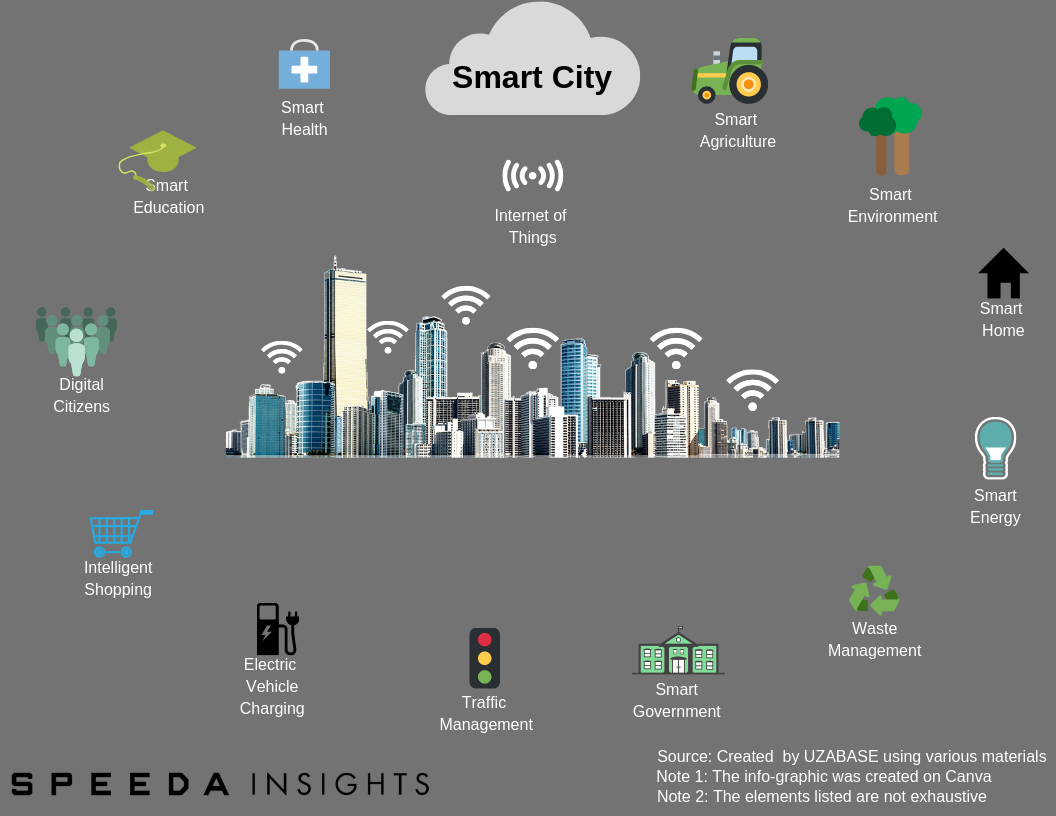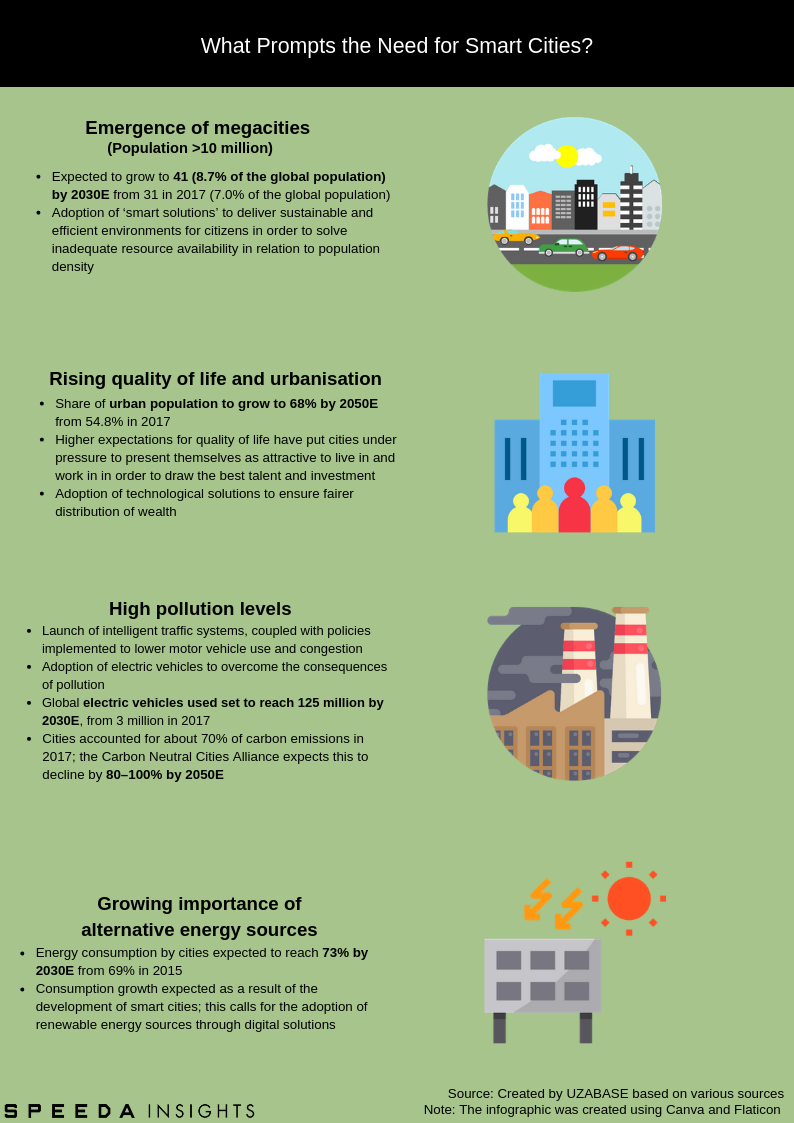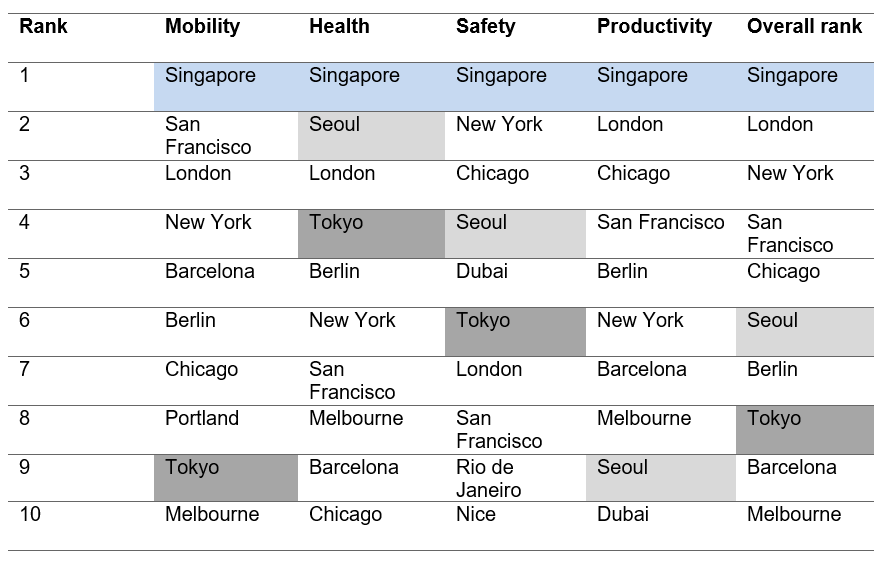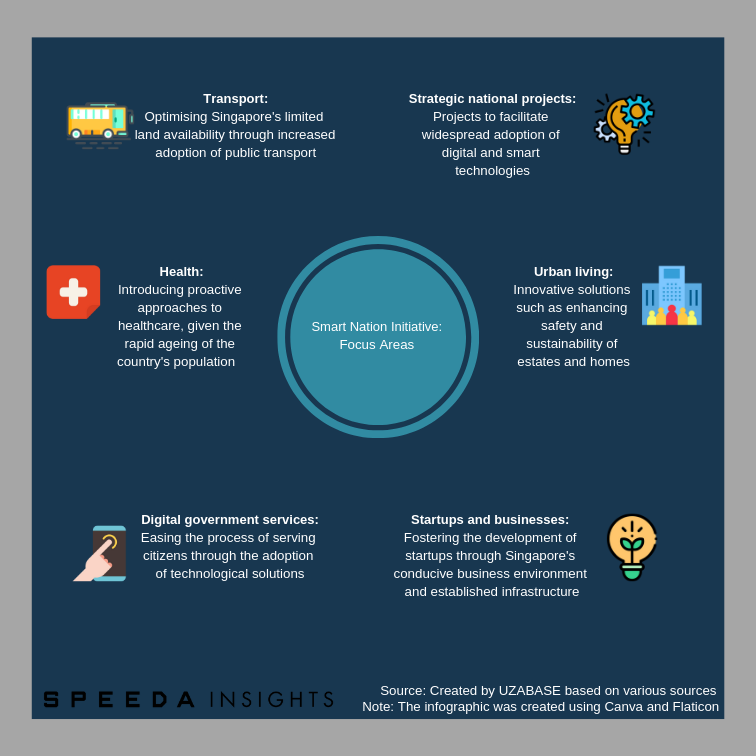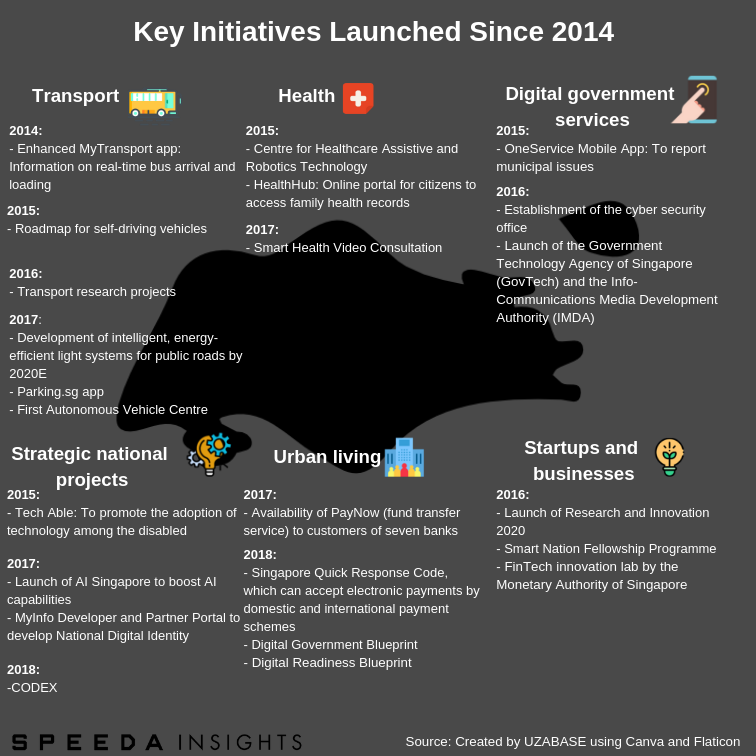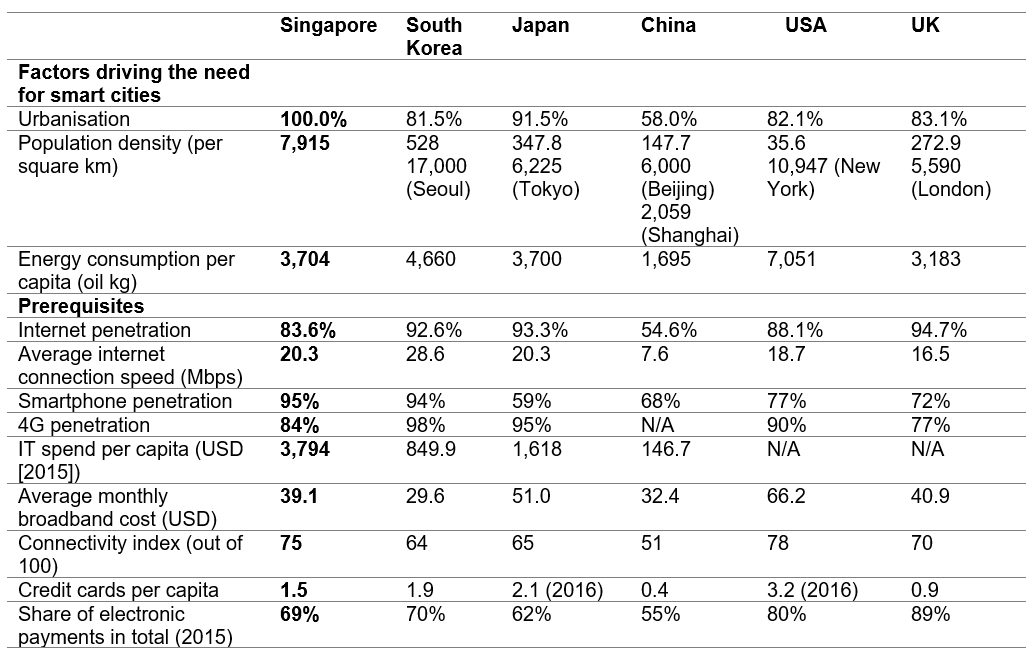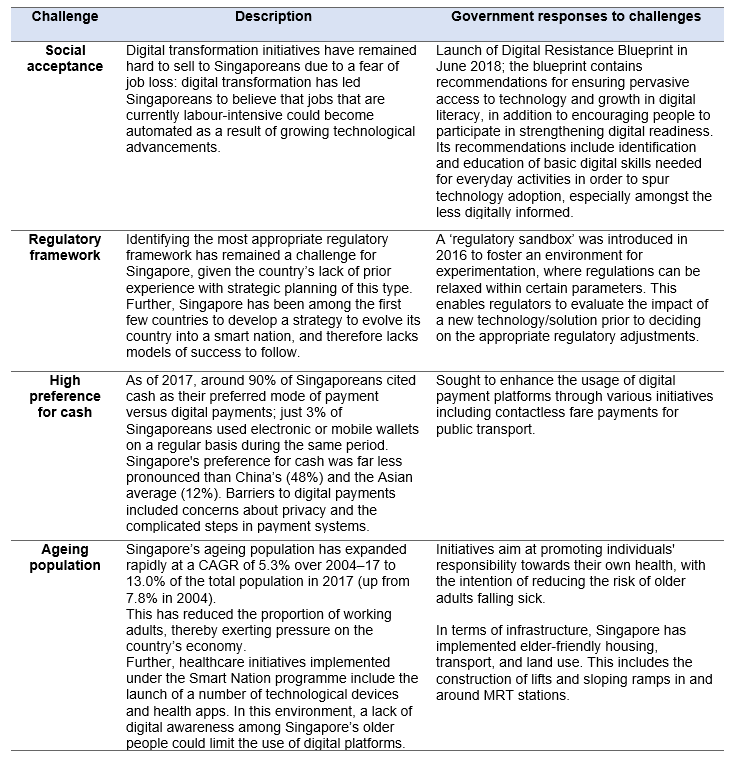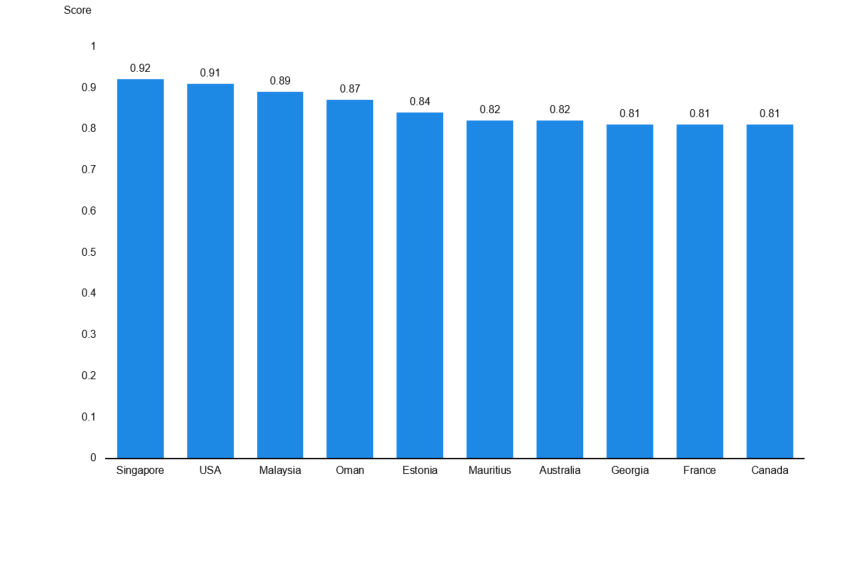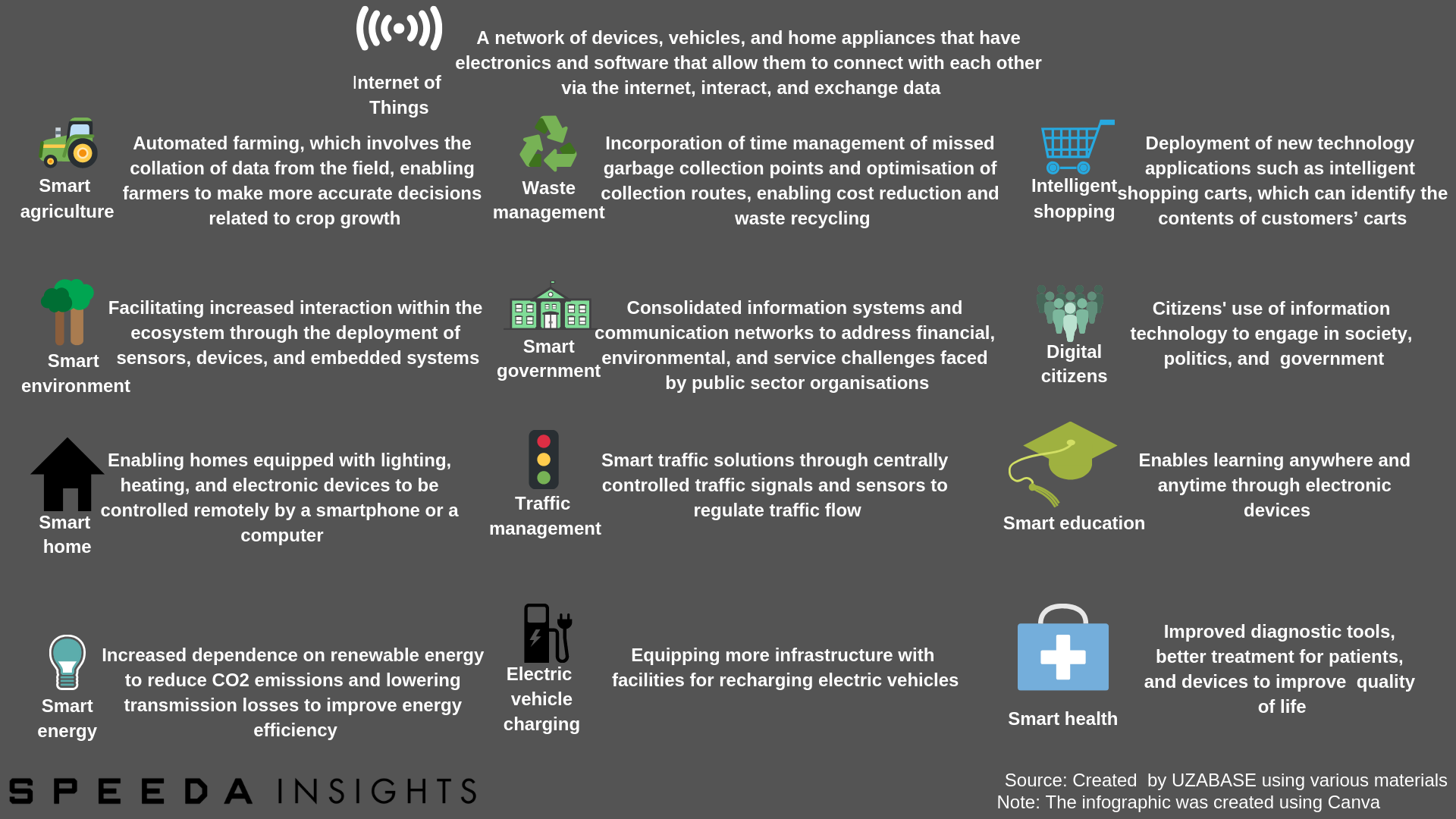Smart Cities: Singapore on Track to Emerge as the First Smart Nation
|
Governments across the globe have shown increasing interest in deploying digital solutions to optimise resource utilisation in their respective cities. A search for smarter responses to challenges such as rising urbanisation and the emergence of megacities has created a need for smart cities. While digital solutions have been adopted across numerous countries, a few cities have emerged at the forefront of the smart city market. Underpinning their success are factors such as strong government support and the presence of well-established infrastructure. |
|
Asia has been instrumental in the development of smart cities, with Singapore leading global advancement towards creating smart nations. Other Asian countries that have made impressive progress towards smart city development include South Korea and China. |
|
Singapore’s leadership has been backed by its government’s launch of a ‘Smart Nation Initiative’, which focuses on transforming Singapore into a smart nation. This transformation requires substantial government investment and the achievement of high digital literacy. Despite Singapore’s strength, the country continues to face challenges on the path to its goal — especially in the area of cybersecurity. The Singaporean government has actively sought to implement solutions to minimise and overcome cyberattacks. Despite robust systems in place, cybersecurity remains the biggest threat to smart nation development. Against this backdrop, Singapore may need to focus on continuously strengthening its cybersecurity system in order to become a smart nation. |
|
Emergence of Megacities and Rapid Urbanisation the Key Factors Driving Need for Smart Cities |
|
Smart cities can be defined as urban areas that use digital technology and shared knowledge to enhance the lifestyles of its citizens across various aspects such as mobility and health. Smart cities have emerged as a result of technological advancements, including the development of the Internet of Things (IoT) and rapid growth in internet and mobile penetration. Technological solutions mean enhanced productivity amongst citizens of smart cities. For instance, smart solutions to mobility are expected to enhance traffic management and mitigate congestion, in turn reducing the time people spend on roads. In addition, smart city development is expected to play a pivotal role in responding to the challenges faced by the world’s growing urban population and the emergence of megacities. |
|
|
|
|
|
Strong Governmental Support and Continuous Investment Place Singapore at Forefront |
|
Governments across Asia have shown a particular focus on the emergence of smart cities, owing to rapid growth in urbanisation in the region. The share of Asia’s urban population grew at a CAGR of 4.9% over 1990–2015 (latest available data) in comparison to North America (CAGR of 2.1%) and Europe (CAGR of 0.5%). |
|
Countries that have actively sought to transform their cities into smart cities include Singapore, China, South Korea, and Japan. Singapore’s progress towards becoming a smart nation is driven largely by factors such as the enhancement of public transport. In China and South Korea, initiatives centre on tackling urbanisation. Meanwhile, energy efficiency remains a focus in Japan’s smart city initiatives. Moreover, of the 41 megacities expected to emerge in 2030E, 24 are to be located in Asia. Within Asia, megacities are expected to arise mainly in China and India. |
|
In the Global Smart City Performance Index compiled by Juniper Research, Singapore emerged as the leading smart city globally in 2017, followed by London and New York. The ranking was based on performance across four key indices: mobility, health, safety, and productivity; Singapore secured the top position in each index. Within Asia, Singapore was followed by Seoul, Tokyo, and the Chinese cities Wuxi, Yinchuan, and Hangzhou. |
|
Top 20 Cities in Global City Performance Index, 2017 |
|
|
|
Source: Juniper Research |
|
Singapore ranked as the world’s third most densely populated country as of 2017, with a population of 7,915 people per square kilometre. The country’s high population density could be attributed to its sizable share of immigrants (46.7% of the total population in 2017), which has resulted in overcrowding. The country’s high population density, coupled with its stable economic growth (GDP registered a CAGR of 2.2% over 2012–17), has prompted the government to seek new opportunities to overcome the challenges that overcrowding poses. Thus, Singapore’s leadership in smart city development has been backed by strong government support, including the creation of a ‘Smart Nation and Digital Government Group’ in 2014 and high expenditure incurred on improving the country’s infrastructure. |
|
Singapore’s Smart Nation and Digital Government Group has been responsible for the formulation and continual rollout of smart nation initiatives since 2014. Given Singapore’s smaller size, its leadership has also been attributed to its low level of bureaucracy relative to peers’, an attribute that has enabled faster implementation of initiatives, following faster approval processes. |
|
|
|
|
|
Singapore ranked as the world’s most technologically informed country in 2017, as per International Business Times. The impressive rank was attributed partially to the country’s efforts to embrace key technological developments, including artificial intelligence (AI) and the IoT. |
|
In addition to government investment, Singapore has seen an influx of private equity (PE) and venture capital (VC) investments in the technology sector. In particular, Singapore saw a record value of PE and VC investments in 2016, of which 34% (volume: 53%) was in technology, including in cloud computing, ‘big data’, and the IoT. Significant investments in technology have enhanced connectivity in the country. In the Global Connectivity Index (GCI) compiled by Huawei, Singapore ranked second in terms of connectivity in 2018, with a score of 75, behind only the USA. In addition to investments, other factors underpinning Singapore’s leadership include a high level of 4G network coverage, IT access and usage, and smartphone penetration. In particular, the Singaporean government has been making continuous efforts to embrace the use of cloud computing, including announcing the transfer of its IT systems to commercial cloud services over 2018–23E, with the purpose of delivering services to citizens faster and more economically. In April 2018, the Asia Cloud Computing Association recognised Singapore’s cloud computing system as the Asia-Pacific region’s strongest. |
|
Factors Driving Need for Smart Cities and Prerequisites for Smart City Development (2017) |
|
|
|
Source: Compiled by UZABASE based on various sources |
|
Note: Data for 2015 is the latest available for IT spend per capita and electronic payments |
|
In terms of social readiness for technology, PwC gave Singapore a rating of 49% in 2017, equal to the average value (49%) for all cities globally. Singapore’s social readiness was nevertheless lower than that of its Asian peers Shanghai (76%) and Hong Kong (53%), implying that Singapore may still show some resistance to embracing digitalisation. |
|
Government Efforts to Overcome Obstacles Could Aid Progress Towards Smart Nation Development |
|
Despite continuous efforts made in the pursuit of a smart nation, Singapore still faces a few challenges against achieving this goal; the key challenges identified include social barriers and the country’s ageing population. Singapore’s government has made continuous efforts to overcome these challenges through the establishment of various initiatives. |
|
Key Challenges to Achieving Smart Nation |
|
|
|
Source: Compiled by UZABASE based on various sources |
|
Recent Cyberattacks Call for Continued Focus on Cybersecurity, Despite Government Efforts Towards Strong Cybersecurity Network |
|
Increased usage of digital platforms calls for higher levels of cybersecurity. Singapore has therefore emphasised on strengthening its cybersecurity system. Following the launch of the country’s Smart Nation initiative, Singapore launched a Cyber Security Agency (CSA) in 2015 to oversee its cybersecurity strategy and operation. The main functions of the agency include the following: |
|
●Improving cybersecurity awareness ●Ensuring adequate resources are in place to respond to and mitigate cyber attacks ●Strengthening cybersecurity across critical sectors including energy, water, and banking ●Ensuring the effective deployment of responses to cyber threats |
|
Accordingly, in 2017, Singapore led the UN’s Global Cyber Security Index, which factors in each nation’s commitment to cybersecurity. Singapore was awarded a score of 0.92 (out of 1), ahead of the USA (0.91) and Malaysia (0.89). |
|
Singapore: Number One in UN’s Global Cybersecurity Index, 2017 |
|
|
|
Source: UN International Telecommunication Union |
|
Moreover, the Singaporean government enacted a ‘Cybersecurity Act 2018’ in August 2018. The act created a regulatory framework for the monitoring and reporting of cybersecurity threats to essential services in Singapore through the appointment of a Commissioner of Cyber Security. The act’s objectives include strengthening the protection of critical information infrastructure (CII) against cyberattacks in addition to establishing a framework for sharing cybersecurity information. |
|
Singapore has also sought to strengthen cybersecurity within ASEAN, accordingly launching a regional cybersecurity training centre in September 2018 to deliver virtual cyber defence training and exercises for all ASEAN member states. |
|
Singapore has nevertheless been prone to cyberattacks in recent years. For instance, in July 2018, the government’s health database was exposed to a major cyberattack, resulting in the breach of personal information of over one million individuals. The government called the attack the most serious breach of personal data ever seen. One of the reasons stated for the cyberattacks is a lack of acceptance of the need for cybersecurity measures amongst businesses, given that implementing cybersecurity measures is viewed as an additional cost rather than as a benefit. |
|
Appendix |
|
Components of a Smart City |
|
|




